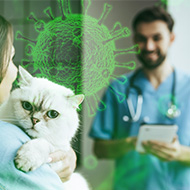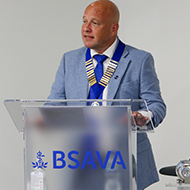
Profession responds to second RCVS survey of the COVID-19 pandemic.
The RCVS has published its second report of the impact of the the COVID-19 pandemic, revealing an improvement in practice turnover and fewer staff members self-isolating with suspected symptoms.
More than 250 practices responded to the second RCVS survey of the COVID-19 pandemic, sent to 3,139 practices between 1-5 May. This is compared to the 532 responses to the first survey, which took place in April.
The survey reveals that fewer practices were affected by vets and veterinary nurses having to self-isolate with suspect COVID-19 symptoms. In the April survey, some 30 per cent of respondent practices were affected by this compared to 20 per cent in the May survey.
It also found that the majority of respondents (69 per cent) were seeing a reduced caseload, including some emergency work, while 26 per cent had reduced to emergency caseloads only. This is compared to 97 per cent of practices in April that had limited their caseloads to emergency or urgent cases only.
The survey also highlighted an improvement in practice turnover, with 46 per cent of respondents noting there had been a 25 to 50 per cent drop in turnover, while just six per cent of practices reported more than a 75 per cent fall in turnover. In the April survey, 42 per cent of respondents reported a 51-75 per cent fall in turnover, while 24 per cent reported a fall in turnover of more than 75 per cent.
Commenting on the finding, RCVS CEO Lizzie Lockett said: “This latest survey has identified some positive trends in terms of a slight uptick in business, including turnover, and fewer incidences of staff having to take time off with COVID or COVID-like symptoms.
“I am glad to see that the framework we published in April has, so far as we can see, provided veterinary professionals with greater guidance and reassurance regarding the fact that if it is feasible to do something safely under social distancing guidelines, then they can go ahead if they choose to.”
She continued: “We left plenty of scope for veterinary professionals to use their clinical judgement as to what services actually offer, depending on their facilities, level of staffing, availability of protective equipment, local disease pressures and so on.
“However, it is also clear that we are, by no means, out of the woods and that veterinary businesses are still struggling financially, with some of them reporting a very acute impact of the coronavirus and the associated restrictions on their businesses.
“We will continue to monitor the situation via these regular surveys, with the next one planned for early June. I would urge as many practices as possible to continue to complete them so that we can build up a stronger evidence-base on how veterinary businesses have been affected.
“This information is not only vital for our own policy decisions but also allows us to present a stronger case to the Government and other public bodies where we wish to influence the decisions they make that will impact the veterinary professions and businesses.”
The full survey results can be found on the RCVS website.



 Julian Hoad has been confirmed as the new president of the British Small Animal Veterinary Association (BSAVA), taking over from Carl Gorman.
Julian Hoad has been confirmed as the new president of the British Small Animal Veterinary Association (BSAVA), taking over from Carl Gorman.